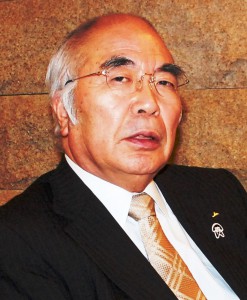After the Trans-Pacific Partnership member countries closed their ministerial meeting in Singapore without reaching any agreement, JA-Zenchu head Akira Banzai told The Japan Agricultural News in an interview that he will continue closely monitoring the TPP negotiations and demanding the government to protect key agricultural products from tariff elimination.
Q. How do you evaluate the current situation of the TPP talks?
A. In the latest ministerial meeting, as in previous meetings, Japan was in a difficult situation as exporting countries of food products strongly called for tariff cuts, including tariffs on sensitive agricultural items. But I reckon Japanese negotiators and Liberal Democratic Party lawmakers in Singapore worked together to maintain their stance based on the resolutions adopted by the Diet committees and the LDP.
When we made a set of requests regarding the TPP talks on Friday, Feb. 21 prior to the ministerial meeting, Prime Minister Shinzo Abe responded that the government will negotiate in line with the resolutions. In the national meeting of farmers held the previous day, LDP Secretary-General Shigeru Ishiba clearly expressed determination to follow the resolutions, saying it was not anything of a joke for the party and the Diet’s committees to state the government would withdraw from the talks if the resolutions cannot be met. I always say that trust is what politics is all about.
Q. How do you cope with the TPP talks and the Economic Partnership Agreement negotiations with Australia from now on?
A. The next crucial stage for the TPP talks would come in April when U.S. President Barack Obama visits Tokyo, and in May when the trade ministers of the Asia-Pacific Economic Cooperation member nations are scheduled to hold a meeting. But the Obama administration has not even managed to obtain trade promotion authority which delegates Congress’ authority on trade negotiations to the government to make it easier for the U.S. president to negotiate international trade agreements. The U.S. government will not be able to change its hard-line stance, as the midterm Congressional elections are expected in November.
There is a possibility for the U.S. to raise the TPP issue in relation with security issues around the time when Abe and Obama are to meet in Tokyo. But even if Japan makes compromises in the TPP negotiations, we can’t really expect the U.S. to give preferential treatments to Japan in a relationship which also involves China and South Korea.
Japan must be proceeding with bilateral negotiations with such countries as Australia to pressure the U.S. to make compromises in the TPP talks, but we haven’t seen any change in the U.S.’ harsh negotiating policy so far. We demand that the Japanese government conducts bilateral negotiations with Australia in line with the Diet resolution for EPA with Australia, which states that key agricultural products should be exempt from tariff elimination or be negotiated separately.
The TPP negotiations have been going on for a long period of time, and we shouldn’t think the talks would just fade. We shouldn’t stop monitoring the talks until we are sure that the resolutions – the promise made to the public – are realized. The Japanese government has not made compromises in bilateral negotiations with the U.S. because of growing calls among the public to keep the resolutions. We must work together with consumers’ groups and keep urging the government to observe the resolutions no matter what.
Interviewed by Hirobumi Senbongi
(Feb. 27, 2014)


